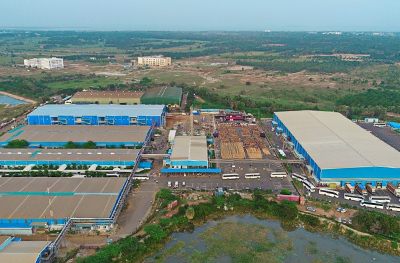Three top contract manufacturers for Apple plan to commit almost $900 million towards making iPhones in India.
Foxconn, Wistron and Pegatron plan to make the investments to take advantage of India’s mega electronics manufacturing investment scheme called the Production-Linked Incentive (PLI), according to unnamed sources quoted by Reuters today.
The $6.65 billion scheme offers companies lucrative cash incentives, including a 6% financial boost on additional sales of locally manufactured products over five years, with 2019-2020 set as the base year.
It’s aimed at turning India into a global hub of high-quality smartphone manufacturing and to support Prime Minister Narendra Modi’s push to make the country self-reliant.
Foxconn has applied to invest about 40bn rupees ($542m), while Wistron and Pegatron have committed to invest close to 13bn rupees and 12bn rupees, respectively, under the scheme, the sources said.
China+1 Strategy
While none of the vendors commented on the report, India is increasingly emerging as a hub for handset making with the government adopting various policy support measures and curbing other hurdles.
“India has recognised that it has a disability in not possessing the capability to make high-end handsets like other competing economies,” George Paul, CEO of the Manufacturers’ Association for Information Technology (MAIT), told Asia Financial. MAIT claims to represent 70% of the mobile handset makers in India, including Samsung, Apple, Xiaomi, and Wistron.
“This is translating into various incentives like the PLI scheme for handset manufacturing, the phased manufacturing programme, and incentives for setting up an electronic manufacturing cluster with provisions that can attract both global and local makers. The business environment for the production of mobile phones in India is therefore, improving, and rapidly”, Paul added.
ALSO SEE: Foxconn Expanding iPhone production in India
Industry sources say the PLI has been crafted not only to make handset making attractive in India, but also to help international manufacturers – especially the large brands – focus on a “China+1” approach.
China+1 refers to a supply strategy that seeks to diversify away from China being a company’s single source.
“All iPhone makers are trying to balance production capacities outside of China – which is locked in a trade war with the United States – as a de-risking strategy to diversify supply chain beyond China,” one of the country heads of these three vendors told AF, requesting anonymity since he is not an authorised spokesperson.
“Besides, the incentives are also considered to be most attractive in Asia,” he added.
Boosting iPhone Manufacturing Capacity
It is unclear whether all of the investment will be targeted towards boosting manufacturing of Apple devices in India, but the sources and industry insiders said the vast majority would be focused on expanding iPhone manufacturing in the country.
“The incentives offered are based on production and the selling prices. In India only foreign makers have the wherewithal to manufacture and also sell high-value [handsets], so the provisions attract global majors in particular, because they have a much higher ability to add value in India,” said Paul.
Almost all international brands produce locally 90% of the phones they sell in India to sidestep 20% import fees on handsets.
“Going forward these players will not only increase capacity but also increase value-addition,” he added.
In 2017, Apple started assembling a low-cost iPhone model in India through Wistron’s unit in the tech hub of Bengaluru. It later ramped up production, with Foxconn assembling iPhones last year and Wistron widening operations.
While Foxconn, Pegatron and Wistron make devices for companies other than Apple globally, Wistron’s arm in India assembles only iPhones.
Wistron, which assembles roughly 200,000 second-generation iPhone SEs per month in India, plans to scale that up to 400,000 a month by the end of the year, one of the sources said, as it looks to cater to export demand for the device.
That plan is expected to create roughly 10,000 jobs, the source added.
Pegatron is yet to start Indian operations, but has been in talks with several states; Tamil Nadu in the south has emerged as a frontrunner for a planned plant to manufacture Apple devices, a third source said.
Foxconn, which assembles devices for Xiaomi in India, already has enough capacity to meet Xiaomi’s needs and is likely to use the incentive scheme largely to boost iPhone production, a source said.
Growing Interest
The emergence of India as an alternative handset production hub has also sparked interest of other major handset brands. A global component supplier also manufacturing in India said that LG, Lenovo and Intel are keen to invest but their plans are not public yet.
Samsung is also ramping up production in India, while 15 international handset makers have expressed interest for making in India under the PLI scheme, according to the national Minister for Electronics and IT, Ravi Shankar Prasad.
“With growing uncertainties around Chinese vendors like Huawei, BBK and Xiaomi, we want to look for lower-risk names and less vulnerable production sites,” a European procurement manager told AF. He said he is scanning the Indian market for attractive vendors because his retail customers do not want to get caught in the trade and manufacturing tensions between China and the United States.
The manager also said that his company has started evaluating several Indian smartphone manufacturers to determine whether they could replace Chinese vendors like Xiaomi or BBK Electronic Corp’s Vivo, Oppo and RealMe brands.
• By Indrajit Basu, with reporting by Reuters
This report was updated for style purposes on December 21, 2021.
ALSO SEE:
Apple launches an affordable iPhone
























